Since his inauguration on May 29, 2023, His Excellency, Senator Uba Sani, has redefined healthcare delivery in Kaduna State through strategic investments, evidence-based policies, and a commitment to Universal Health Coverage (UHC). In less than two years, his administration has made remarkable strides in improving healthcare infrastructure, enhancing service delivery, and strengthening human resources for health. These efforts have positioned Kaduna State as a model for health system strengthening in Nigeria’s North West region.
By Umma Khaltume Ahmad
Healthcare infrastructure: Building the foundations of progress
Governor Uba Sani’s administration has prioritized the expansion and upgrade of healthcare facilities to meet the growing needs of Kaduna’s population. Key achievements include:
- Primary Healthcare Centers (PHCs): 255 PHCs have been upgraded to Level-2 facilities, enhancing Basic Emergency Obstetric and Neonatal Care (BEmONC) and reducing maternal and neonatal mortality rates.
- General Hospitals: Renovation projects for 13 General Hospitals are ongoing, with Lere General Hospital completed to improve secondary healthcare services.
- Millennium City Hospital: The 300-bed Millennium City Hospital is 98% complete and poised to provide advanced care in oncology, nephrology, and cardiology.
- Kaduna State Centre for Disease Control (KDCDC): This facility is under development to strengthen epidemic preparedness, disease surveillance, and rapid response mechanisms.
Advancing service delivery: Saving lives across Kaduna
The administration’s focus on service delivery has led to measurable improvements in maternal and child health outcomes, communicable disease management, and emergency response systems:
- Maternal and Child Health: Institutional deliveries have increased from 17.6% to 25.9%, while the establishment of 120 neonatal care units has significantly reduced neonatal morbidity and mortality. Ready-to-Use Therapeutic Food (RUTF) distribution has decreased child stunting from 48.1% to 40.7%.
- Communicable Diseases: Kaduna State now leads Nigeria in TB case detection with a 20%+ increase. Surveillance efforts have been bolstered by deploying motorcycles and vehicles for TB and leprosy detection. Additionally, 100% of HIV-positive pregnant women are now receiving treatment to prevent mother-to-child transmission.
- Non-Communicable Diseases: Over 1,425 free eye surgeries have been conducted, including pediatric cases, restoring sight for many citizens.
- Emergency Medical Services: The launch of the Kaduna State Emergency Medical Services and Ambulance System (KADSEMSAS) has improved emergency response times dramatically.
Human resources for health: Empowering the workforce
Recognizing the importance of skilled health professionals, Governor Uba Sani’s administration has implemented several initiatives to strengthen workforce capacity:
- Medical Residency Training Fund (MRTF): Funding for 85 doctors has increased the number of specialists in tertiary hospitals across the state.
- Community Health Influencers Promoters and Services (CHIPs): Recruitment of 4,000 CHIPs has extended healthcare services to remote areas.
- Salary Scale Improvements: The implementation of a 100% CONMESS salary scale has enhanced workforce retention rates significantly.
Health financing: Expanding access through insurance
The administration has made significant progress in financial risk protection by increasing health insurance enrollment by over 21%, from 527,303 enrollees in 2023 to 639,432 in 2024. Furthermore, an additional 70,000 vulnerable persons were enrolled under the Kaduna State Contributory Health Management Authority (KADCHMA), ensuring broader access to free healthcare services.
Challenges and policy recommendations
Despite these achievements, challenges persist in workforce shortages, incomplete infrastructure projects due to funding gaps, limited insurance coverage causing high out-of-pocket costs, delayed budget releases affecting service delivery, and low adoption of Electronic Medical Records (EMR). To address these issues, the following recommendations are proposed:
- Expand postgraduate training for specialists at Barau Dikko Teaching Hospital to address workforce gaps.
- Strengthen rural retention incentives to ensure equitable distribution of health professionals across all areas of the state.
- Complete ongoing hospital renovations and expand solar power installations for uninterrupted service delivery.
- Increase budget allocations for healthcare aligned with global best practices to ensure sustainable financing mechanisms.
- Accelerate EMR implementation across secondary healthcare facilities for improved patient data management and service delivery efficiency.
Conclusion
Under Governor Uba Sani’s leadership, Kaduna State has achieved transformative progress in healthcare delivery within a short timeframe. By sustaining investments in infrastructure development, workforce empowerment, digitalization efforts, and financial protection mechanisms, Kaduna can solidify its position as a leader in Universal Health Coverage (UHC) across Nigeria’s North West region. Continued commitment to these priorities will ensure that every citizen enjoys access to quality healthcare services—a legacy that will endure for generations to come.
Ahmad is the Commissioner of Health in Kaduna state


